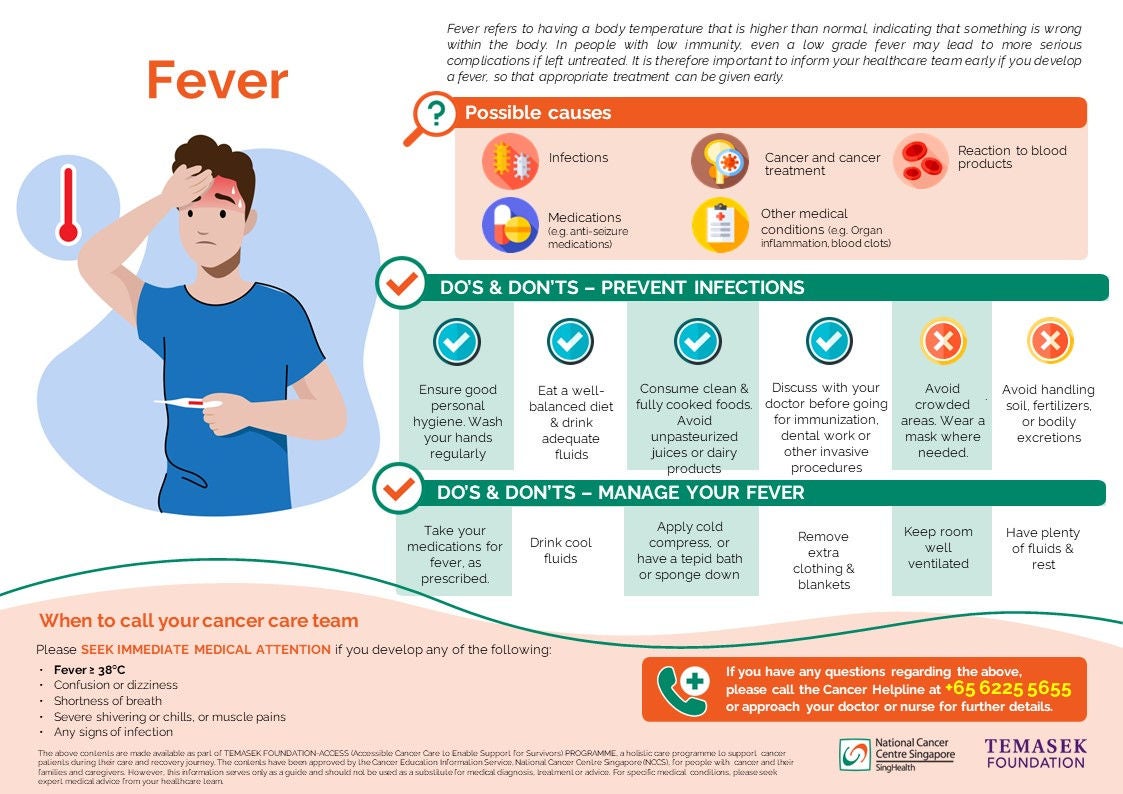National Cancer Centre Singapore will NEVER ask you to transfer money over a call. If in doubt, call the 24/7 ScamShield helpline at 1799, or visit the ScamShield website at www.scamshield.gov.sg.
Fevers and Infections
- Allergies
- Appetite Loss
- Bone Problems
- Breathing Problems
- Constipation
- Diarrhoea
- Difficulty Swallowing (Dysphagia)
- Dry Mouth (Xerostomia)
- Difficulty Sleeping (Insomnia)
- Feeling Tired (Fatigue)
- Fevers and Infections
- Hair Loss
- Heart Problems
- Menopausal Symptoms
- Indigestion
- Joint Pains
- Limb Swelling (Lymphedema)
- Muscle Aches
- Nail Changes
- Nausea and Vomiting
- Pain
- Tingling or Numbness in Hands or Feet (Peripheral Neuropathy)
- Skin Changes
- Sore Mouth (Oral Mucositis)
- Taste Changes

Fever refers to having a body temperature that is higher than the normal of 37.4 degree celcius, indicating that something is wrong within the body. It is common for people with cancer to develop fever, due to a number of reasons.
Causes of Fevers
- Infections
An infection is caused by the invasion and growth of germs (e.g. bacteria, viruses, fungi) in any part of the body. Cancer treatment such as chemotherapy and immunotherapy can weaken the immune system for a short time, causing it to be more prone to infection. Infection is usually the most common cause of fevers in people with cancer. - Cancer
Some cancers are more likely to cause fevers than others. For instance, certain types of lymphomas can cause high body temperatures and night sweats without any obvious reason. Also known as “malignant fever” or “tumour fever”, these fevers come and go, and the reason is still poorly understood. - Certain medications (e.g. targeted treatments, drugs to prevent bone loss)
- Reaction to blood products
- Other medical conditions (e.g. organ inflammation, blood clots)
What you need to look out for
- Body temperature of more than 37.4 degree celsius
- Chills and rigors (severe shivering)
- Feeling very tired and having generalised body discomfort
- Feeling confused or dizzy
- Flu- like symptoms
- Cough with or without phlegm
- Difficulties in breathing
- Sore mouth
- White coating in the mouth or on the tongue
- Vomiting
- Severe abdominal discomfort or pain
- Urination problems (e.g. painful urination, cloudy or blood in urine, very little or no urine for > 12 hours)
- Unusual vaginal or penile discharge
- Diarrhoea
- Any body area with redness or swelling
- Pain, redness or discharge from catheter site
- Any other abnormal and prolonged symptoms, which cause concern
How it can be treated
The treatment for fever will depend on what is causing it. For instance, fever caused by infections will be treated by antibiotics, antiviral or antifungal medications, depending on the type of germ found in your body. To manage fever caused by the body’s reaction to blood transfusion, your nurse will stop your blood transfusion and give you some medications to curb the reaction.
To determine the cause of your fever, your doctor will ask you a series of questions such as when the fever started, any associated symptoms and medications you are currently taking. Your doctor will also examine you and may order tests (e.g. x-rays, blood tests) to establish the exact cause or find out if there are any complications. To bring down your temperature and relieve your discomfort, you may be given paracetamol or an anti-inflammatory medication to take regularly until the fever goes away. If your white cell counts are low, your doctor may also prescribe you with growth factor drugs to increase your white cell counts to fight infection.
What you can do
Having a fever can be uncomfortable and worrying, and it is important to inform your doctor or care team early if you develop one, so that he or she can determine the cause and give you appropriate treatment early. Even a low grade fever may lead to more serious complications if left untreated, so do not wait for other signs before you seek medical attention.
Below are some tips you may find helpful in preventing infections and managing fever, especially if you are undergoing treatment for your cancer:
Prevent infections
|
|
Managing fever
|
|
When to call your cancer care team
Please inform your doctor or nurse if:
- You develop any fever, especially if you are undergoing cancer treatment
- You notice any of the symptoms listed earlier
- Your fever or symptoms do not improve even after treatment
The below indicates possible severe infection, a MEDICAL EMERGENCY which requires IMMEDIATE MEDICAL ATTENTION, especially if you are undergoing cancer treatment: please go to your nearest hospital as soon as possible. Delayed treatment may result in serious or even life-threatening complications from infection:
- Feeling very unwell
- Feeling confused or disoriented
- Severe shivering or muscle pain
- Not passing urine for 24 hours
- Feeling very breathless or dizzy
If you have any questions regarding the above, please call Cancer Helpline at +65 6225 5655 or approach your doctor or nurse for further details.
Click here to download the PDF version of this article.
如果您要下载本文的中文版本,请点击此处。
Klik di sini untuk memuat turun versi PDF artikel ini.
The above contents are made available as part of TEMASEK FOUNDATION-ACCESS (Accessible Cancer Care to Enable Support for Survivors) PROGRAMME, a holistic care programme to support cancer patients during their care and recovery journey.
The contents have been approved by the Cancer Education Information Service, National Cancer Centre Singapore (NCCS), for people with cancer and their families and caregivers. However, this information serves only as a guide and should not be used as a substitute for medical diagnosis, treatment or advice. For specific medical conditions, please seek expert medical advice from your healthcare team.
Brought to you by:
![]()
![]()
Keep Healthy With
© 2025 SingHealth Group. All Rights Reserved.

















